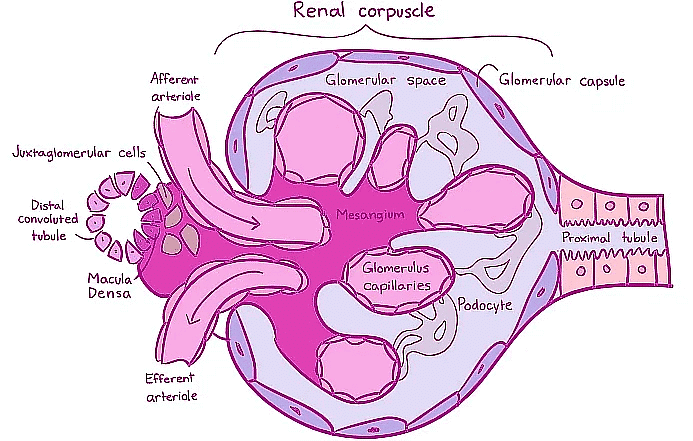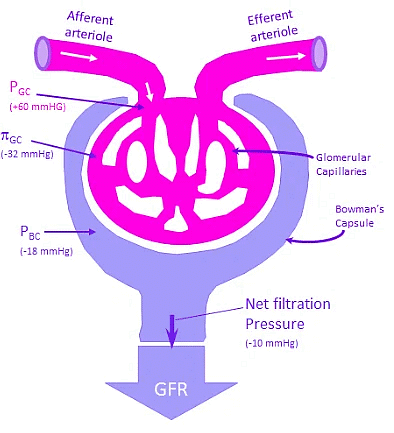MCAT Exam > MCAT Notes > Biology for MCAT > Renal physiology: Glomerular Filtration
Renal physiology: Glomerular Filtration | Biology for MCAT PDF Download
Introduction
The human body's renal system plays a remarkable role in maintaining overall health. One vital process carried out by the kidneys is glomerular filtration, which serves as the initial step in urine production. This article explores the concept of glomerular filtration, shedding light on its significance and the mechanisms involved.
Understanding Glomerular Filtration
Glomerular filtration is the process through which the kidneys filter excess fluid and waste products from the blood into the urine-collecting tubules. By eliminating these substances, the body maintains a healthy balance and prevents toxic build-up.
The Importance of Urine Formation
Urine production might seem trivial, but it is crucial for maintaining the body's internal stability. The kidneys receive a substantial amount of blood, approximately a liter per minute, and efficiently eliminate around 1.5 liters of urine daily. This process enables the removal of excess water and waste products, ensuring optimal physiological functioning.
- Substances Excreted in Urine: Urine contains various substances that are excreted to maintain bodily equilibrium. Metabolic waste products like urea and creatinine, along with electrolytes such as sodium and potassium, are eliminated through urine. Additionally, water-soluble waste products and colorful soluble pigments from certain foods and medications find their way into the urine.
- The Kidneys as Natural Blood Filters: Conceptualizing the kidneys as natural blood filters helps comprehend their role in maintaining solute balance. These organs regulate the water and dissolved substances (solutes) in body fluids by selectively reabsorbing essential components and producing urine to eliminate the rest.
- Nephrons: The Key Players: Nephrons, the microscopic structures within the kidneys, are responsible for urine production. Each kidney contains approximately a million nephrons, each equipped with a specialized filtering unit called a glomerulus.
How Glomerular Filtration Works
At the core of glomerular filtration lies the glomerulus, a tuft of blood capillaries responsible for filtering the blood. The glomerular capsule, located at the end of each nephron, houses the glomerulus. The capillaries of the glomerulus possess small pores that act as a fine mesh sieve, allowing fluid and solutes to pass through while preventing blood cells from filtering out.
- The Unique Structure of Glomerular Capillaries: Unlike typical capillary beds, glomerular capillaries are sandwiched between afferent and efferent arterioles. This arrangement helps maintain a high glomerular capillary pressure necessary for effective filtration. The efferent arteriole's constriction regulates blood flow, ensuring adequate pressure within the glomerulus.
- Layers of the Glomerular Capillary Wall: The glomerular capillary wall consists of three layers: the endothelium, basement membrane, and epithelium. These layers work together to selectively filter substances. The endothelium possesses larger pores, the basement membrane prevents the filtration of plasma proteins, and the epithelium, composed of podocytes, forms filtration slits for final filtration before fluid enters the glomerular space.
Renal Corpuscle: Glomerulus and Glomerular Capsule
The glomerulus, together with its surrounding glomerular capsule, forms a renal corpuscle. This filtering unit ensures efficient glomerular filtration, while other specialized capillaries called peritubular capillaries provide countercurrent exchange, aiding in urine concentration.
- Measuring Glomerular Filtration Rate (GFR): The glomerular filtration rate (GFR) quantifies the rate at which blood is filtered by the kidneys. It depends on the net filtration pressure, which is the outward pressure minus the inward pressure. Various mechanisms, including renal autoregulation, neural control, and hormonal control, contribute to regulating GFR and maintaining stable kidney function.
- Regulation of Glomerular Filtration Rate: The body has sophisticated mechanisms to regulate GFR, allowing it to remain relatively constant despite changes in blood pressure. Renal autoregulation, neural control, and hormonal control work together to ensure efficient glomerular filtration. Factors such as blood pressure, plasma volume, and hormonal influences all play a role in modulating GFR.

The Significance of Creatinine in Assessing Kidney Function
Creatinine, a waste product of creatine metabolism, serves as a valuable indicator of kidney function. Since creatinine is exclusively filtered through the kidneys, its excretion rate directly reflects renal filtration efficiency. By measuring creatinine levels, along with other factors, medical professionals can estimate the glomerular filtration rate (GFR) and evaluate kidney health.

Conclusion
Understanding the process of glomerular filtration is vital for comprehending the complex physiology of the kidneys. This intricate mechanism enables the efficient elimination of waste products and excess fluid from the bloodstream, contributing to overall health and maintaining homeostasis. By exploring the underlying concepts and mechanisms of glomerular filtration, we gain valuable insights into the remarkable functionality of our renal system.
The document Renal physiology: Glomerular Filtration | Biology for MCAT is a part of the MCAT Course Biology for MCAT.
All you need of MCAT at this link: MCAT
|
233 videos|16 docs|32 tests
|
Related Searches















